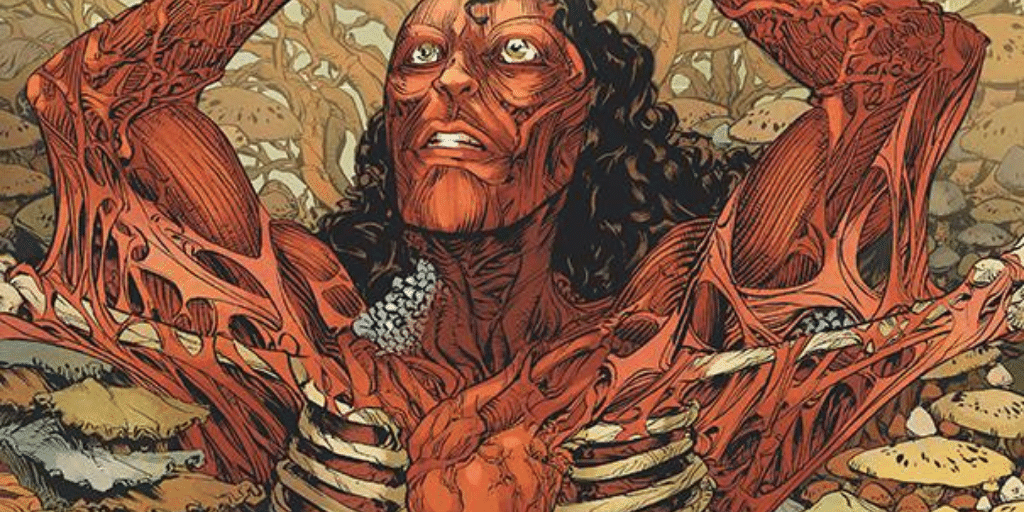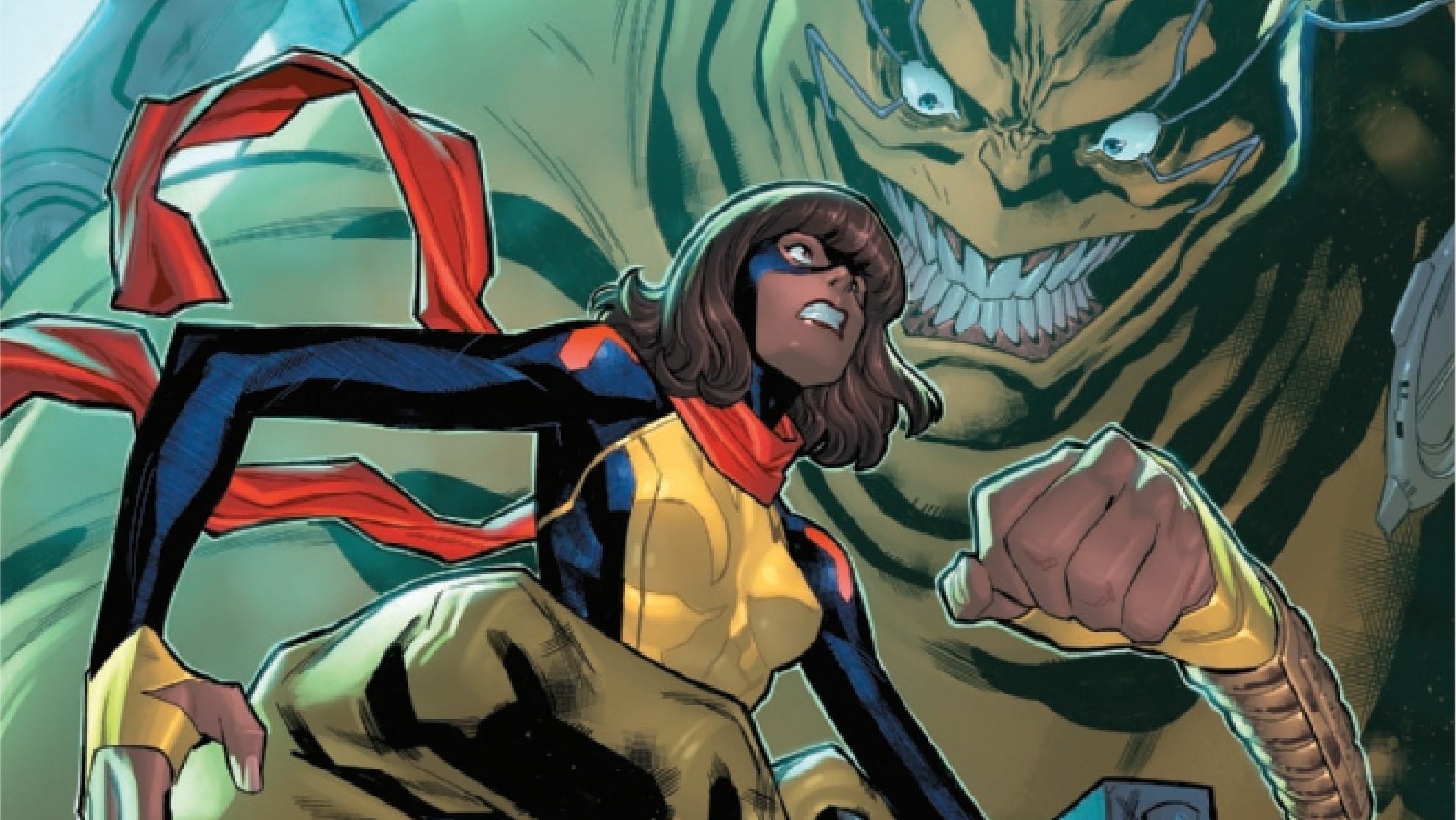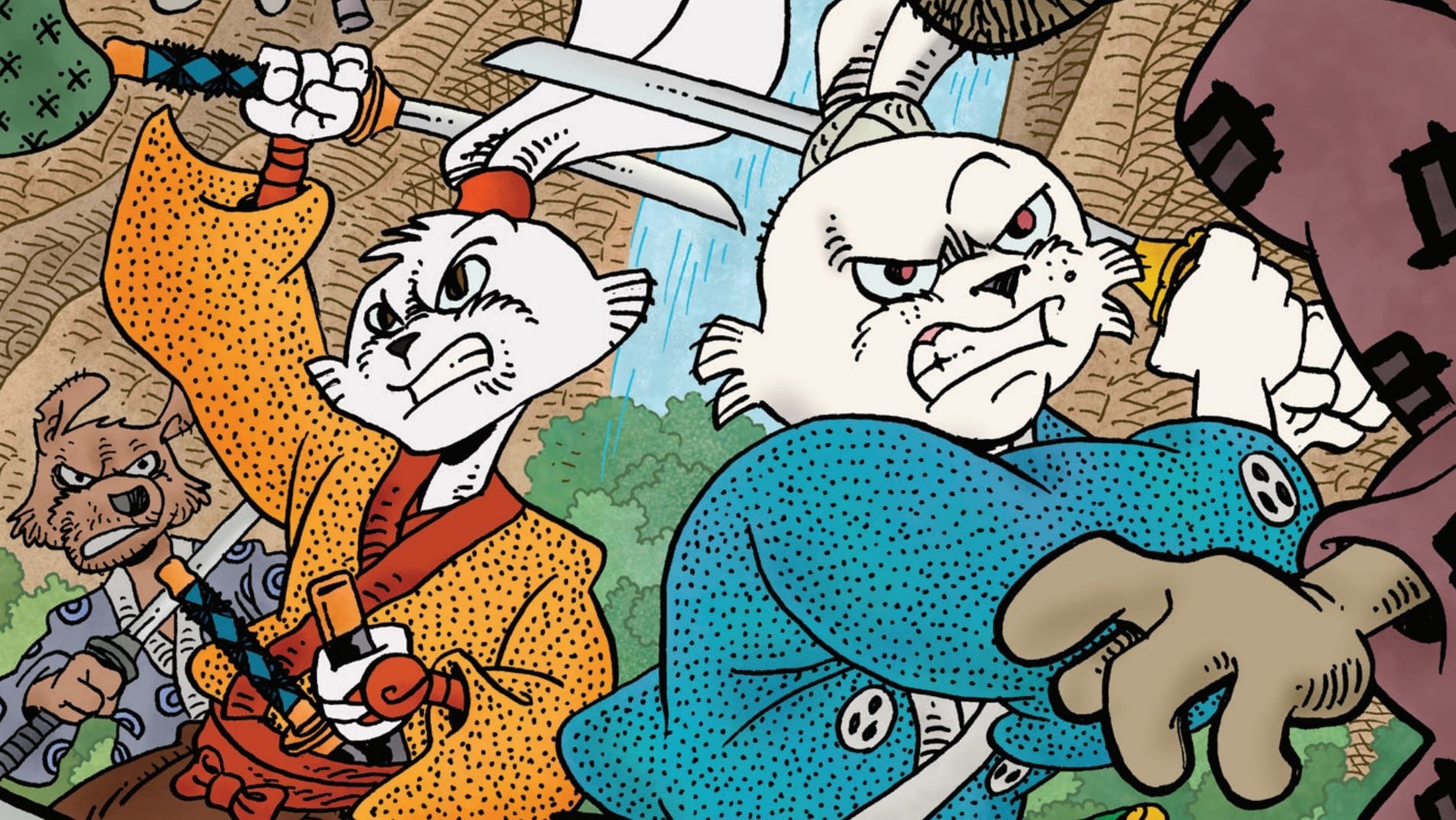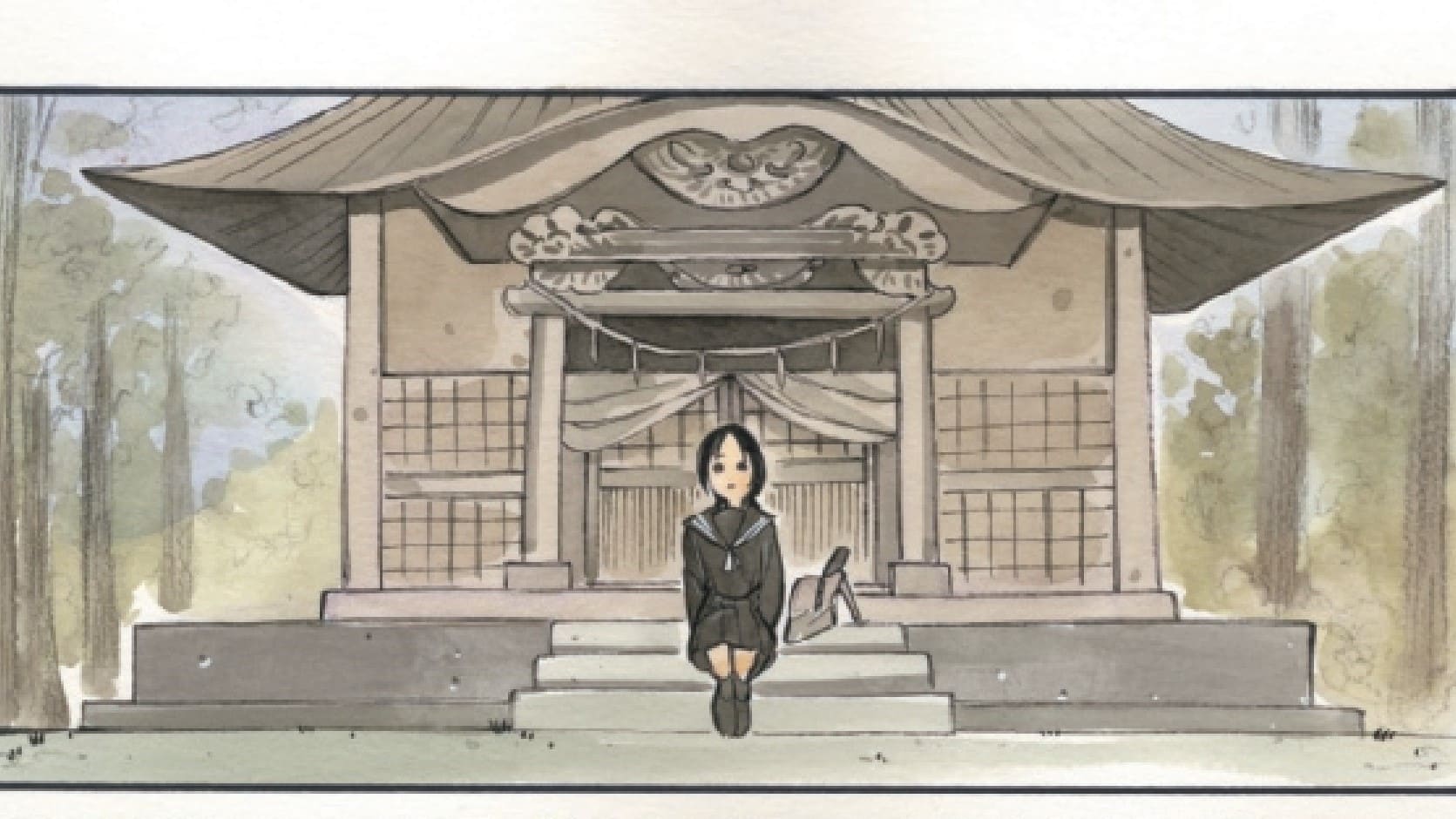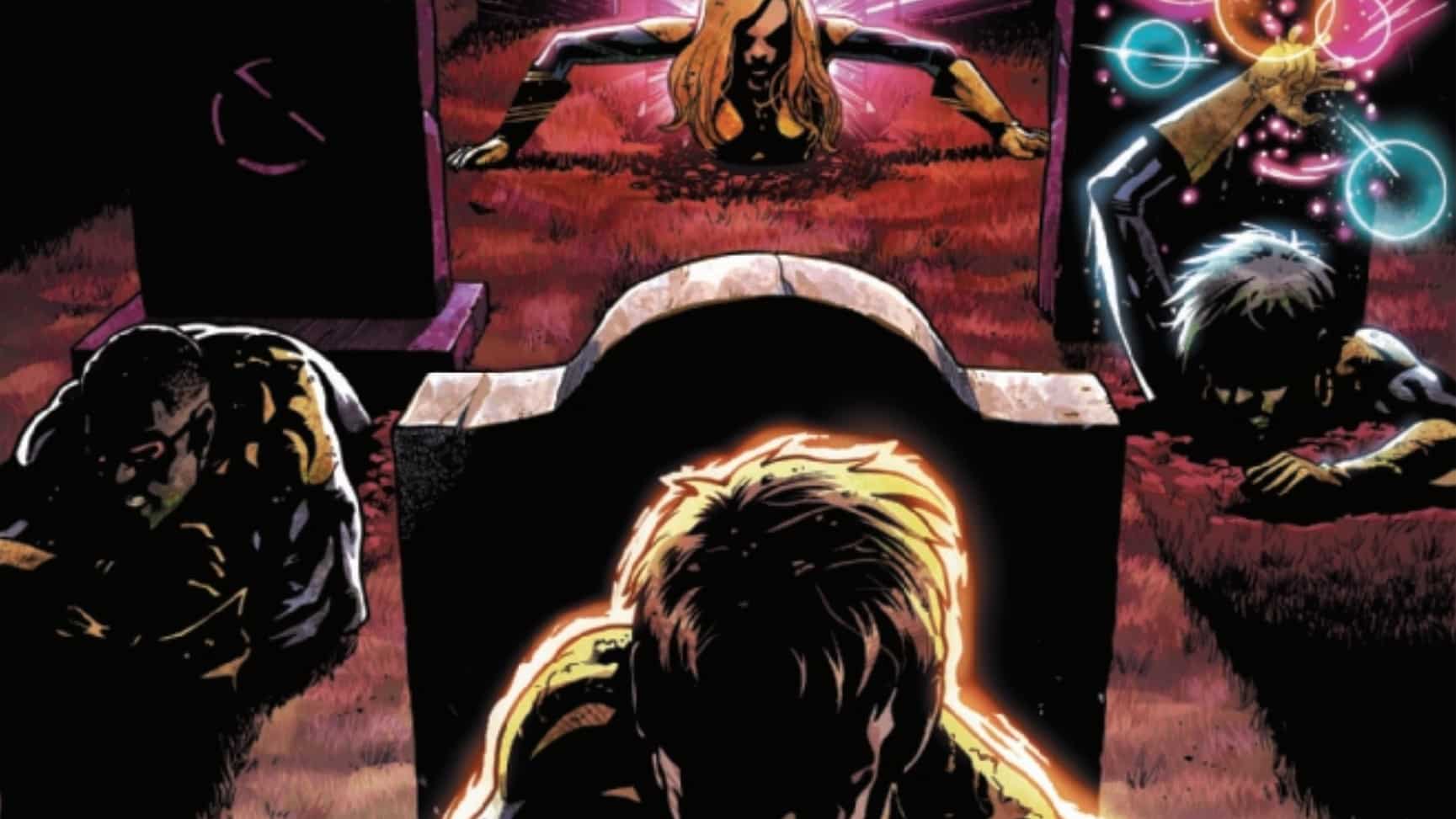When the world’s biggest influencer posts something irredeemably horrific online, the world changes in an instant. Now it’s up to his social media manager, Anne Stewart, to fan the flames of outrage and create a sensationalist campaign that rewrites the rules of “banned content.” Thus begins a carnival of lust, revulsion, desire and disgust — all for viral videos. Let’s get reviled by AfterShock Comics’ I Breathed a Body #1 by Zac Thompson, Andy MacDonald, Triona Farrell and Hassan Otsmane-Elhaou.
Content Warning: This article contains discussions on self-harm.
Robert Secundus: When I started becoming more involved in comics than being just a casual reader — when I started writing about comics, and seeking out a community of critics and readers — Zac Thompson was one of the creators doing the work I was most excited to talk about. His X-Men event with frequent collaborator Lonnie Nadler, Age of X-Man, is probably key to me being here, in this article right now. More recently, his work on No One’s Rose with Emily Horn and Alberto Jimenez Alburquerque, and his work on Lonely Receiver with Jen Hickman were some of my favorite books of 2020, a year in which my mental health very much required good art.
His collaborator on this book, Andy MacDonald, I’m less familiar with. I’ve enjoyed his superhero work when I’ve encountered it (particularly Multiple Man), but I really found his horror work in Rogue Planet interesting; but I wasn’t prepared for the preview pages of this book, with his art and Triona Farrell’s colors, pages which were grotesque in the best way. So just given the creative team, I’ve been extremely excited for this book — but I’ve been excited to talk about it with you because it’s not just a Thompson, MacDonald, Farrell, Otsmane-Elhaou joint; it’s about things I think are really interesting in this bizarre time, things that have been on my mind quite a lot for the past few years. I’m excited to dive in.
Zachary Jenkins: I’m a big fan of Zac Thompson, regardless of if he spells his name the third worst way. I own a bootleg Age of X-Man blanket, No One’s Rose was my book of the year, I think he’s neat. Andy MacDonald did some fantastic work over at Marvel with the aforementioned Multiple Man and the underrated Wolverine: Infinity Watch. So the creative team got me pumped for this, but the premise sold me. A weird sci-fi commentary on the impact of social media and the role of influencers in our day-to-day lives? As someone who has described himself as a medium-sized fish in the world’s smallest pond, this resonated with me.
Fungi

ZJ: If you have seen anything from the marketing of this book, it’s the prevalence of mushrooms. This may be a story about technology, but it is deeply rooted in nature. The MyCee network is based on both our current internet and the mycelium latticework that fungi use to communicate, filter and spread. Rob, what did you think of this conceit?
RS: It was intriguing enough that I’ve begun to read up on these weird, weird things in our environment. Fungi are fascinating. As we see more of this world (and I read more substantially on the subject) in the coming months, I hope to have more developed thoughts, but for now I want to point out two things that make the focus on fungi-tech really narratively and thematically interesting.
First of all: Fungi reach out, connect, touch everything in a forest, but not in ways we typically notice as we lumber through it. You have to go looking for the connections; you have to be able to capture the spores, dig up the roots of trees, trace that lattice throughout the Earth. But even if you don’t notice it, it’s still there, aiding the ecosystem, giving life and devouring it. It’s a fitting image for the internet and for social media as it stands, this strange thing that is quite literally in the air we breathe, sending signals through and to us constantly.
ZJ: Mushrooms are often seen as a symbol of rot and decay, and while that is a part of their function, they serve a much larger ecological purpose. In the same way, the internet has connected you and I, Rob. We’ve never met each other, but we’ve gotten to know each other, and the largest driver of that was Twitter. That site connects people, but it has also been instrumental to the resurgence of fascism in the Western world. There’s good and bad to it, and it’s legitimate to ask which is more important.
Now you said you had two things that interest you about mushrooms. If connections were the first, what was the second?
RS: There’s a quirk in fungi networks. This theoretical fungi-network is, like real fungi, radically decentralized. This is cutting edge science fiction, in that it’s an idea that’s extremely relevant right now. Tech giants, after, bizarrely, falling in love with BitCoin, are trying to apply decentralized models to things like social media. Jack Dorsey has been working on this for a bit now, and used his announcement of Trump’s Twitter ban (something I don’t think would have occurred on a decentralized Twitter?) to trumpet it again. Meanwhile, activists are increasingly concerned with gigantic corporations having such control over our methods of communication, as typically that control is not wielded to silence evil, powerful men, but rather those opposing such figures. A centralized internet has powers, uses and horrors; so does a decentralized one, just different ones.
ZJ: There’s a real interesting dynamic when it comes to centralized vs. decentralized power. For instance, many folks will lament the near monopolistic power of Amazon while complaining that the world would be better if there was only one streaming service with all the power to control the media people consume. Google’s dominance in search means businesses have unparalleled power to microtarget advertisements and help consumers find things easier. It also means they have an unsettling amount of personal data on individuals.
We chose to participate in these networks, to become another node on their web, because it gives us something of value. But does the average individual understand what they might be giving up? These are interesting and relevant questions that sci-fi should be asking. To Thompson and MacDonald’s credit, dressing this up with mushrooms helps provide enough distance from the subject matter that they avoid being too preachy.
RS: It’s distance, but I think it’s also one of those cases where you can see the subject better at a distance, or through some science fiction lens, rather than up close; “tell the truth but tell it slant” and all that. The fungi really highlights the life, the growth and, as you said, the rot and decay that’s at the heart of these systems. I think your point about monopolies vs. fragmented markets (if that’s the right term; I’m no Business Guy With Money Knowledge, I do iambic pentameter and shit) is an important one here, too, because in either case the root problem is still capitalism. And that’s what we’re seeing in this series, and what we’d expect to see still in Jack Dorsey’s BitCoinified Twitter: If the system is rooted in capitalism, it will still have problems. If the coding language is fundamentally broken, it doesn’t matter what you program. It won’t run.
A Fun Guy

ZJ: He’s not the protagonist, not by a long shot, but our story revolves around social media influencer Mylo Caliban. He’s part prank YouTuber, part Twitch streamer, part travel blogger. He’s the hottest thing on social media, and his reputation is built on being real, radical and raw.
Only, that’s not true. From his perspective, mind you, everything is an outpouring of emotion and energy. What the audience knows is that he has a PR team working to increase engagement, net him sponsorship deals and minimize the impact of any snafus. The ominous opening scene of this comic implies that he was very literally manufactured to be what he is. It’s a vivid take on influencer culture.
RS: That opening scene is haunting, and I’m not sure of its implications beyond what you say, that this kid has been quite literally made for this job. He’s obviously a troubled kid even before he livestreams a horrifying act of self-violence; he has an extremely strained relationship with the father who profits off of him, and his pranks often hurt people. Most telling is his attempt at an apology, which becomes an excuse to praise his fans and insult his critics. The backmatter (though obviously a work of PR) complicates him in a few ways; for one, his pranks often seem to be works of activism. For another, he’s become a kind of digital god. At one point he’s described as having mastered “manic apathy,” a fascinating oxymoron that I want to explore more in later discussions [Spoiler: Robert Secundus is going to talk about theology]. He isn’t a Paul Brother; we can understand those types a lot more easily. But he’s got some Paul Brother in him, and the complexity only makes him a bit more unsettling to me.
So, you brought up earlier that you and I are people who know each other via Twitter. That’s one of the reasons why I wanted to talk about this book that foregrounds parasocial relationships and social media — in general, relationships with people I’ve never been in the same room with are important in my life. But I was excited to talk about this book with you in particular because you’re a boss, collaborator and friend who once upon a time was a voice on a podcast in my phone. I imagine you’ve got a lot of thoughts on parasocial relationships and the internet, and you’ve got a lot of thoughts on how those relationships are portrayed in this book.
ZJ: Bud, one of the most bizzare moments of my life was when I was at the comic convention C2E2, talking to one of our mutual friends, and was recognized by someone who only knew my voice. I’ve had some small success with my projects, but I’m aware enough to know that I’m a small voice in a niche hobby. I’m, in this small sliver of the world, an influencer, and the awareness that people are impacted by my words and actions? That is unsettling to me.
I’ve had situations where I’ve put my foot in my mouth, and the idea that any mistake gets amplified tenfold because you have an above average Twitter following? It gives me pause. Parasocial relationships are real, they are scary and they lead to a situation where one person doesn’t realize the influence they have, while the other vastly overestimates their understanding of the intentions of an individual. Nothing is more eerie to me than how this toxic relationship seeps into the minds of nearly everyone on the internet and takes root without anyone realizing it.
RS: I think comics creators might be, of creators in most mediums, the best to examine this (and, to be a bit arrogant, comics critics the best to unpack the work) because the direct market is so small. People gain a tiny platform, but because that platform is higher than the average reader, it is perceived as massive; fans become fans of creators who are not so far removed from those fans.
Unless something wild happens, I will never speak to Greta Gerwig, Hideo Kojima, Kirsten Valdez Quade, etc., etc. On the other hand, there are multiple comics creators I chatted with on Twitter before I had ever published a single piece of comics criticism, when I had only a few dozen followers. And here’s where things get really messy: Am I friends with any of them? Acquaintances? Am I friends with any of the people who follow my work, that I chat with routinely on Twitter? In both cases, it’s too, too easy to assume too much familiarity, to assume friendship. It is far easier to convince myself that I’m friendly with a comic writer than I am Whit Stillman. I still fall into that trap, even though I’m the kind of person that actively tries to avoid that mentality; hell, I’ve seen Shannon Strucci’s Parasocial Hell documentaries like four times apiece. This stuff is scary.
ZJ: I’d tend to agree. It’s the same kind of instinctual reaction that makes men think the waitress or bartender or stripper really likes them and isn’t just being nice because that’s her job. There’s something about the amplified, always on, nature of the internet that blinds folks to the mental barriers we normally set up. It’s important that Mylo isn’t some punk trying to manipulate his fans. He honestly believes he’s being genuine. He doesn’t understand the power he possesses, and this comic promises to capitalize on that folly.
RS: You mentioned how this stuff can amplify mistakes, but it can also amplify abuse, and, as we see in the comic, it can amplify pain. The issue concludes with a horrifying act of violence that clearly comes from a place of deep trauma, and that trauma is then inflicted on masses of fans who did not consent to becoming part of that. The whole thing is complicated by the fact that the violence is self-harm; but abusers can threaten and wield self-harm, too. I’m not saying Mylo necessarily is abusive or is an abuser here — but given his behavior generally, and given the trauma he causes, I think an argument can be made for that frame. And the relationships between parasocial relationships, abuse and violence really do need examining — these are some ingredients in the wretched recipe that gave us the Capitol insurrection. It’s extremely dangerous stuff.
A Big Lie

ZJ: This chapter follows a day in the life of Anne Stewart. She is Mylo’s handler, stewarding a potential PR nightmare that plays like an exaggerated version of Jake Paul using the 2020 Black Lives Matter protests to film the looting of a P.F. Changs or Logan Paul filming his reaction to finding a corpse in a “suicide forest.” She’s a guardrail for him, a director and, most importantly, desperate to get equity in his father’s company. We don’t learn much about her, save that she’s running from her past, but we can see she is driven to get what she feels like she deserves. She doesn’t care if bodies get left in the wake of her star, just as long as her star keeps rising.
RS: I do think above all else she wants that equity, or she wants capital, social and otherwise. But there’s part of her that seems to want something more, too — she briefly mentions (and this may not be the truth) that she at one point thought she was going to make art with Mylo. So some part of her is the sellout, some part still the artist. We see her snap a ’gram, and then instantly block some person from that past; so she wants to be seen, but she wants to hide. She’s an interesting lead, I think, in large part because she seems so driven by these tensions, internal conflicts.
ZJ: As a dude with a private Twitter account who used to run a much larger one as an extension of his personal brand? Those tensions resonated with me. Anne is deeply flawed and incredibly complicit in the horrors she helps Mylo unleash. She wants to be seen and have an impact, but doesn’t want to be the one blamed when things go wrong. She wants to engage on her own terms, but none of us really get to do that.
Since we don’t own the platform, the network, we have to engage on their terms. Our relationship with an audience is dependent on us creating content, a post, a picture, a video, and releasing it without restriction on what can or can’t be done with it. You can create barriers to it, though monetary restrictions like Patreon or OnlyFans, but you still can’t control how people react.
That reaction, and the choices Anne makes in response to that, looks to be the inflection point for the rest of this series. Live, on camera, Mylo has done something grotesque. Something you wish was unthinkable, but you know has already happened in the real world. What happens next? Well, Rob, I can’t wait to see.
RS: Me too. I Breathed a Body is already grotesque, beautiful, horrifying and engaging with extremely vital problems of our cultural moment.
Misc.
- The necklace-skinflayer-mushroom-thing ends the issue saying, “I have no lips but I must speak,” riffing on the Harlan Ellison story about a different kind of digital hell, “I Have No Mouth, And I Must Scream.”
- I [Rob here] typically enjoy Otsmane-Elhaou’s lettering experiments; I don’t know entirely how to feel about the highlights here, but I think one neat thing is they replicate (for me) the feeling of reading through something with hyperlinks. It’s not quite the same thing as italicizing for emphasis; it’s a kind of pseudo-emphasis we only ever encounter online.
- I [Zack here] was distracted by it every time it popped up and saw it as lettering becoming intrusive. Your mileage may vary.
- MacDonald doesn’t get much opportunity to let loose in this issue, but the moments where he gets to explore ecological and body horror elements really shine. We’ll have a lot more to say about that next time.

